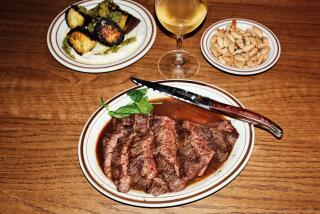N. California : Hearty Beers Make Splash at ‘Brewpubs’
- Share via
SAN FRANCISCO — Northern Californians tired of the beers available in supermarkets are stepping out to “brewpubs”--saloons where the owners make a headier, heartier brew in the back room.
“The power of the beer master is the power of the alchemist of 1,000 years ago,” said Buffalo Bill Owens, who owns a Hayward brewpub. “This is not Burger King. If you want it your way, you’ll have to make your own.”
Five brewpubs have opened in Northern California since the Legislature changed a law three years ago to allow such operations. California is one of six states that have made such a change.
In most states, laws require brewers to sell to wholesalers, wholesalers to sell to retailers and retailers to sell to consumers. Assemblyman Tom Bates (D-Oakland) was tired of uniform commercial beers and pushed through the law allowing direct sales by brewers.
“It’s like what happened in the bread and coffee industry,” Owens said. “Ten years ago, you had white bread and one kind of coffee. Now you go into Safeway and see shelves of gourmet bread and 12 kinds of coffee beans.
“So why do you have to taste the same dull mass-produced beer at every bar?”
Brewpub fans are beginning to see such a choice. Besides Buffalo Bill’s in Hayward, brewpubs have sprung up in Berkeley, Santa Cruz, Petaluma and in Hopland in Mendocino County. Owens, who publishes a newsletter, said no brewpubs have yet opened in Southern California.
San Francisco’s first, called the San Francisco Brewing Co., is scheduled to open by September. Its owner, Allan Paul, said he eventually wants to brew a heavier beer with an alcohol content of about 6.5%. Most American beers have 3.8% alcohol content and most light beers have about 3%.
Paul said quick inebriation is not the goal.
“We’re trying to get away from alcohol as a drug and getting back to beer as food, as liquid bread,” he said. “We’ll have a family atmosphere where even children will be allowed with adults to watch the brewing process.”
The brewers who already are making beer and ale admit that sometimes their foaming products are inconsistent in quality.
“Major brewers strive for consistency,” said John Martin of the Roaring Rock in Berkeley. “People who come in here don’t look for consistency. For us, it’s almost impossible.”
Martin and his brother, Reid, are brewing ales, ranging from pale ale to porter, three or four days a week. The brewing operation is visible through a window above the bar.
‘Fits In With . . . Bread’
John Martin said home brew “is the kind of thing Berkeley people like. It fits in with the homemade bread and ice cream. If this was an area with a long-neck bottle mentality, it probably wouldn’t sell as well.”
Customer Zack Aragon, 36, said the Roaring Rock ales have “a lot more flavor.”
“Coors or Bud, that’s generic beer,” he said. “I’m not a beer expert, but there’s a discernible difference.”
John Martin said brewpubs are on the verge of a boom.
“In five years, we’re going to see lots of brewpubs--some good, some bad,” he said. “I hear about a pizza parlor that wants to put in a little system. It’s just another gimmick to sell their pizza.
“If it’s bad, people will say, ‘Those little places can’t make good beer.’ We’ve got to hope enough serious brewers get involved.”
Owens said it can cost $300,000 or more for a brew master to get the equipment to start a brewpub operation. The advantage, he said, is that “we sure don’t have to create a market. It’s there.”
More to Read
Sign up for Essential California
The most important California stories and recommendations in your inbox every morning.
You may occasionally receive promotional content from the Los Angeles Times.













